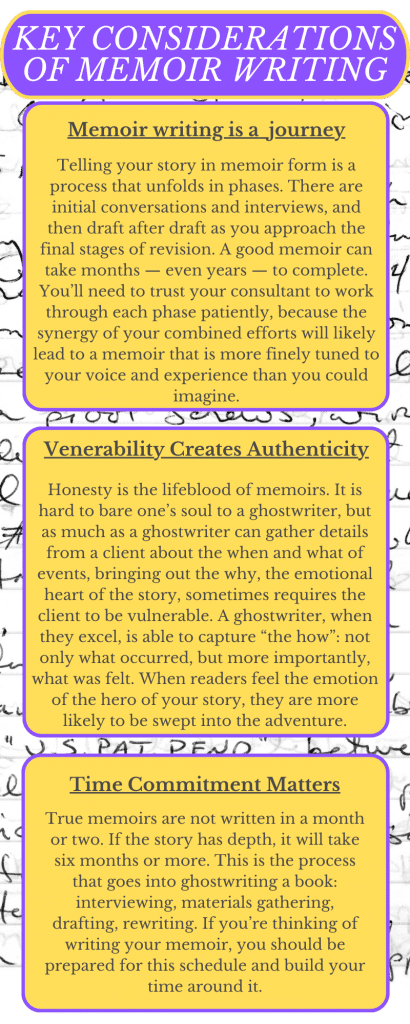The Insider’s Perspective: What Ghostwriters Wish Clients Knew Before Starting a Memoir Project
November 15, 2024
Writing a memoir is a deeply personal and collaborative journey. When you hire a ghostwriter to help shape your story, you’re bringing in a professional who not only organizes memories but captures the essence of who you are.
Ghostwriters turn life events into narratives that feel true to the client’s voice. But a successful memoir depends on more than just writing skills; it relies on a strong, collaborative connection.
As ghostwriter Andrew Crofts explains, “The best ghostwriting happens when the client and the writer are completely in sync, allowing the client’s voice and vision to shine through without compromise.” When clients approach memoir writing as a partnership—one that requires openness, trust, and active participation—the final work is a memoir that’s authentic and engaging.
In this blog, we’ll share insights from ghostwriters on what they wish clients knew before starting a memoir project. From preparing for emotional moments to understanding the time commitment, these tips will help ensure your memoir-writing experience is fulfilling and aligned with your vision.
Understanding the Process: What to Know Before You Start
First, let’s clarify what working with a ghostwriter is and what it is not.
Memoir writing is not a “take my material and crank out my book” project. Ghostwriting is a collaborative effort that calls for something from both the client and the writer. Here’s what you need to know to make the process a smooth and rewarding one:

Having a clearer idea of what the process entails can already put you on the path to a fruitful collaboration.
Creating the Foundation
A great memoir is not just a chronology of events; it is a story with a point, a narrative built around themes and messages that organize your life to create coherence and meaning.
When you launch a memoir project, there are certain things that ghostwriters like to see you begin with in order to set the foundation for a great story. Here’s what you can do:
Define the Story’s Purpose and Key Themes
Every memoir has a message. Perhaps you want to provide your family with a legacy about your life, or you want to give readers inspiration and life lessons. Maybe you are seeking catharsis.

Identifying the central purpose of the memoir can help the ghostwriter develop the story in a direction that supports your goals.
You might also identify key themes or messages, such as resilience, transformation, or love, that should be woven throughout the body of the book.
In this role, ghostwriters are storytellers who can create a book that is both entertaining and meaningful.
Nail Down the Story Structure
Prospective authors may expect a simple recounting of events, but memoirs almost always benefit from intentional structuring.
Ghostwriters often arrange memories into major themes or around key moments, rather than following a strictly chronological order, to keep the story interesting and emphasize important experiences.
Ghosts need clients who are willing to trust the creative structuring that brings a memoir to life while still being true to the journey.
Essential Qualities for a Smooth Collaboration
Most importantly, writing a memoir entails a partnership, and a productive relationship between client and ghost depends on certain qualities that ensure both client and ghost feel heard, supported, and aligned throughout the process. For a ghostwriter, the most useful qualities in a memoir client are an openness to receiving feedback and allowing room for some creative freedom.
Openness to Feedback and Revisions
It’s common for a memoir to go through several drafts, and every draft makes the story better.

Revisions are a regular part of the process: they are an opportunity to incorporate feedback and tweak details to make sure the memoir reflects your true vision.
If a client is willing to be flexible, they end up with a better book—one that is more truly their own.
This allows the story to bloom organically and become something you can feel proud to share.
Balance Between Guidance and Creative Freedom
While the client’s voice, personality, and message are the core of the memoir, a little breathing room for the ghostwriter can add flavor.
Ghostwriters are storytellers, and giving them the space to trust their intuition for pace, tone, and flow can make for a more engaging read. Clients who allow for this creative breathing room often find that the finished product is authentic but also compelling, drawing the reader further in with each page.
Capturing the Details: What Makes a Memoir Come Alive
It’s the specific details—the vivid memories, sensory images, and telling moments—that make the difference between a great memoir and a mere chronicle of events.
When you sit down to write your book, your ghostwriter will be looking for the elements that will make your story come to life. Here are two specific things your ghostwriter will be doing to ensure that your memoir will engage your reader and stay in their mind.
1. Finding the Details that Matter
A novel made up of small, specific details—the sound of laughter at a family reunion, the smell of a childhood kitchen, the colors of a favorite place—makes a memory feel true on the page, the same way it feels true to you.
These details allow readers to experience your story vicariously by bringing it to life through sensory details. When your ghostwriter asks questions designed to help you remember, your answers will provide the materials needed for powerful, memorable scenes.
2. Ensuring Your Voice Is at the Core
In an ideal memoir, the voice is entirely the client’s. It must have the cadence, the outlook, and the vocabulary of the person whose story you are telling.

It’s by paying attention to these colorful, intimate details that a ghostwriter can shape a memoir that feels personal and real—immediate and engaging—drawing readers into your experiences.
Ghostwriters know how to do this, but to do it perfectly, they need guidance. If you can share your personality, your way of speaking, and even quotes you tend to use, the ghostwriter will be able to mirror you better.
When your voice comes through, the readers will feel closer to you rather than to the writing itself.
Getting Ready for the Memoir Process
A well-prepared client can make all the difference. By taking just a little time to organize your thoughts and memories before starting, you can make the most of your time with your writer, avoid writing about the wrong things, enrich your story at every turn, and create a collaborative tone that leads to a positive experience.
Collect Personal Artifacts
Gather any items that might help you remember details from your story or provide context—photographs, letters, journals, old notes—anything that can help you relay specifics about your past and give your ghostwriter more material with which to form scenes with depth and emotional resonance.
Keeping these props nearby can make it easier to recall particular events, places, or people that might otherwise be hard to recollect, which will enrich your story.
Schedule Regular Check-Ins
Planning check-ins in advance can keep the project moving forward. Set times to review drafts, ask questions, and talk through the next phase.

These meetings will allow you to provide feedback and flag particular areas you would like to see covered.
It’s helpful to have a sense of progress and feel aligned with the ghostwriter. A little structure goes a long way in making the process feel familiar and manageable.
You’ll create a solid foundation that will allow your ghostwriter to write with your heart and your voice in mind.
The second step—before you actually approach a ghostwriter—is to consider the common challenges clients face in memoir projects and how to navigate them.
Navigating Common Challenges in Memoir Writing
Writing a memoir is a deeply gratifying process, but it can also come with its own set of challenges. From the ghostwriting agreement to the emotional aspects of sharing your life in print, here are some of the most common challenges that clients face—and tips on how to deal with them.
Understand What’s Included
Ghostwriters typically focus on the manuscript, so if you need additional support with services like formatting, publication, or marketing, these will need to be contracted separately. That is, unless you are working with a ghostwriting firm who provides more than just writing.
To avoid surprises, clarify from the start what you and your ghostwriter agree is included in the deal. If your end goal is publication and distribution, it’s a good idea to let your ghostwriter know early so you can plan ahead. Some ghostwriters can recommend editors, designers, or even publication services, ensuring that your finished book can quickly take its next steps.
Prepare for Emotional Moments
Sometimes the process will feel glorious, like when you realize you’ve compiled a wonderful list of the names of your beloved dogs over the years. Other times, it will be difficult, such as when you relive a painful episode of your life.

Many clients experience a rush of emotions—some very happy, some difficult—when they recount memories for their memoir. It’s important to prepare yourself emotionally for this process.
If there are certain topics you feel might be sensitive, you can alert your ghostwriter to them in advance. A good ghostwriter will be sensitive and compassionate, knowing how to handle these moments in a way that preserves the integrity of the story while maintaining your comfort with the material.
The ghostwriter can help you process the past in a way that feels both true to the story and emotionally manageable.
Building a Meaningful Collaboration for a Memoir You’ll Be Proud Of
Memoir writing is an empowering process. It gives you a legacy that will be read—and remembered—with fondness for years to come. When client and ghostwriter are in sync, open, and prepared, writing can be a seamless and rewarding experience. From the effective gathering of details to the maintenance of open communication, every step you take to prepare adds another layer of mortar to the structure of your memoir.
A good memoir is not just a record of what happened, but a reflection of your voice, your lessons, your being. Now, you can embark on this journey with confidence, knowing that you have a ghostwriter at your side.






























